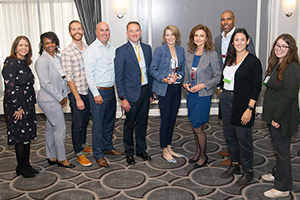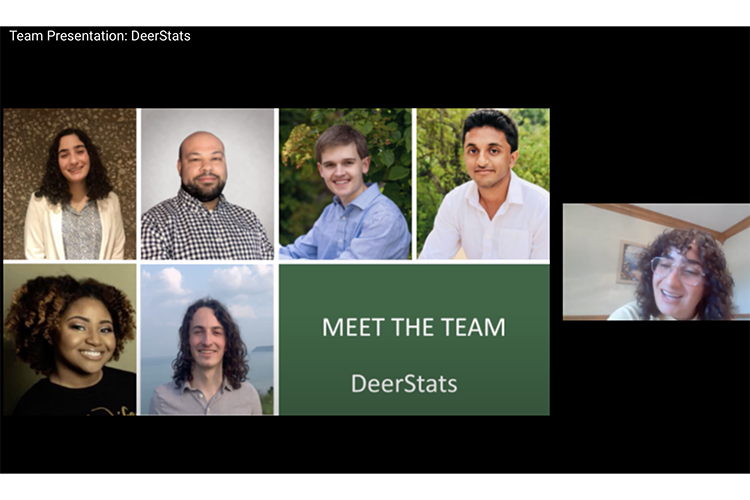Mark Guzman, a recent UWM graduate, worked with a student challenge team sponsored by the Milwaukee Bucks looking at better ways to gather and share data about the basketball team.
Carmen Henry, a senior mathematics major, was part of a team sponsored by Froedtert Hospital that looked at ways to reduce waiting times in the emergency room.
While the topics are wildly different, their experiences were part of a collaboration between HERA and the MKE Tech Hub Coalition. HERA is the Higher Education Regional Alliance, a collaboration of 18 local colleges and universities and partner organizations dedicated to closing student achievement gaps, increasing graduation rates and expanding the region’s talent pool. The MKE Tech Hub Coalition is a nonprofit with more than 100 corporate, nonprofit and education organizations as members. UWM is a member of both organizations.
Summer pre-internship program
The summer pre-internship program, which involved 70 students from local high schools, colleges and universities, was designed to raise awareness of how data and artificial intelligence (AI) are making an impact and to help develop a talent pool to fill high-tech jobs in southeastern Wisconsin. The students earned badges from HERA that are under consideration for credit at UWM. The badges certify their expertise on the impact of data and artificial intelligence and the importance of ethics in working with both.
All students were able to participate free of charge thanks to the MKE Tech Hub Coalition.
After receiving foundational instruction on key topics and skills, participants were broken into challenge teams. Local businesses and organizations drafted challenge statements involving the ethical use of data and AI to explore and also mentored their work along the way.
Guzman, who completed his master’s degree in public administration in spring 2021, worked with a team looking at how the Milwaukee Bucks could better use data analytics and artificial intelligence in their operations.
A better basketball stats solution
The group, which included students from UWM, Northeast Wisconsin Technical College, New Berlin Eisenhower High School, Waunakee Community High School, Marquette University, Waukesha County Technical College and the UW Extended Campus, came up with a sports analytics solution called Deer Stats.

While most people would think there are plenty of basketball statistics out there, research has shown that a good percentage of what happens on the court isn’t captured because cameras don’t cover every play, according to Guzman. Another area that could be potentially helpful is data on the players’ biometrics – blood pressure, heart rate, etc.
The group saw three potential audiences for the information: the teams themselves, who wanted to improve their performance; players, who wanted to play better; and fans, especially those who play fantasy team competitions.
The students aren’t sure what the organizations they worked with will eventually do with their work, but all agreed the experience of working in teams and learning about how AI and data analytics are used in the real world was valuable.
The ethics of using data
A key part of the basketball project, for example, was exploring the ethics of using all this data and intelligence, while balancing the privacy rights of players – deciding how much information should be released and to whom, Guzman said.
Research has shown that a number of developments involving data and artificial intelligence – facial recognition programs, for example – have shortcomings because of the developers’ biases, or the results can be misused, he added.
Some companies are recognizing this and bringing in people with backgrounds in areas like history, journalism and sociology, according to Guzman. “Having a diverse team can help mitigate some of the biases.”
“Certain companies want to have that social studies experience in the development of their products. They’re trying not to create a product in a black box. They want to understand how their products impact society,” he added.
How the tools are actually used
Henry, who worked on the Froedtert team, said she was interested in learning how these tools are actually used in businesses and organizations.
“One of the things I learned is just how much machine learning and artificial intelligence is used in businesses and the great potential it has,” she said. “The speakers did an excellent job of dispelling all the negative myths about AI that are spread across the media.”
Henry found the experience beneficial. Having people in the group of various ages and different medical, education and other backgrounds helped her team think about better ways to improve emergency room processes. “It was really interesting to integrate our different perspectives. It was overall a great experience.”
Guzman would like to use what he’s learned about data analytics and AI and develop programs to support nonprofits and social justice initiatives. Henry is planning a career in data analytics.
Businesses looking for talent
Local industries are looking for more talent in data and AI, according to Phyllis King, associate vice chancellor for academic affairs at UWM.
“With this badge certification, students can now showcase the knowledge they need to fill the jobs of tomorrow,” King said.
“This program gave students It a chance to see what AI is and how it impacts different fields and industries and how they might be a part of it when it comes to exploring their own careers,” she added.
Survey results showed that students felt the program was successful in helping them develop skills, said Laura Schmidt, chief talent development officer for MKE Tech.
“This year’s program showed that we developed something that has value from the higher education perspective as well as for employers.”
Different perspectives
Another goal of the program was to include different perspectives in the work, Schmidt said. “We focused on diversity of thought, perspective and background when we chose candidates.”

“This is especially important in talking about the ethics and impact of data,” Schmidt added. “AI is so ridden with unintentional bias right now. We really wanted students to explore that in their solutions so they can be a really strong advocate for reducing unintentional bias when they go into the workforce.”
The teams had a chance to demonstrate their flexibility when a power outage shut down their planned virtual demonstration of their work in early August. They carried on, sharing videos of each team’s work and sharing online panel discussions.
“There was a moment when we thought we should just cancel and reschedule, but they forged ahead,” Schmidt said. “They wanted to make sure people saw their videos and what they’d accomplished over the course of the summer.”
Program to continue
Plans are underway to fine tune and continue the program next summer, using feedback from this summer’s program, according to King and Schmidt.
Other UWM students involved in this year’s program were: Mueez Odusanya, Nancy Martinez Lazaro, Hageo Gamez, Deepak Khas, Skyler Phillips, Levi Montee, Sayeda Afrah Sultanath, Jarek DeBauche and Patrick Hanks.
On Oct. 27 the HERA/MKE Tech program was honored for its work in developing the local tech talent pool. The program was chosen as a finalist in the regional Metropolitan Milwaukee Association of Commerce Focus on the Future Awards as well as the national TECNA Innovation Awards.







